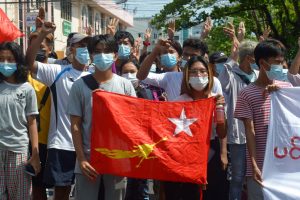Just over three months after Myanmar’s military seized power in a coup, there are ample signs that the country’s blood-spattered turmoil is spreading beyond its own borders, affecting the wider region’s stability and security. Unless the international community can immediately act to contain the brutal, inhumane, and targeted acts of the military and security forces, Myanmar’s crisis is very likely to evolve into a regional one.
Since the military coup, Myanmar’s security forces have viciously attacked those protesting peacefully against the military’s seizure of power on February 1. Even away from the streets, the people of Myanmar have been forced to endure brutal human rights violations and crimes against humanity committed by the state’s security forces. Each day and night has become a nightmare for the people. The future of Myanmar lies in darkness.
The systematic and targeted acts of the military and security forces have led to the deaths of more than 750 people, including dozens of children. The junta has also arbitrarily arrested, charged, and sentenced more than 3,400 people. While in custody, many have been subject to various forms of torture, and, in the case of women and girls, sexual harassment and assault. The death toll is increasing daily. The security forces are also targeting the family members as hostages, in order to track down those wanted for participation in anti-coup protests.
Under Myanmar’s junta, fundamental freedoms, including the right to life, freedom of expression, the right to privacy, and private property rights, have been all but swept away.
All of Myanmar’s people – whether protestors, social influencers, those joining the Civil Disobedience Movement (CDM), or those simply trying to keep their heads down – are living with fear every second, every minute, and every hour. Anyone protesting the military coup is in danger of the military’s lethal use of force, and live with the fear that they may be arbitrarily detained or charged at any time.
With the economy in a state of collapse, survival in Myanmar is becoming more and more tenuous. The U.N. World Food Program has estimated that in the coming six months, hunger will hit 3.4 million people in Myanmar, especially in urban areas. The military’s brutal crackdown now poses existential threats to all individuals, beyond mere violations of human rights.
Those existential threats will not stay contained within Myanmar, but will rather spread far beyond its boundaries. In the three months since the military coup, the vicious crackdown of military has displaced a quarter of a million people. Escaping the junta’s violence, increasing numbers of people are now seeking refuge and protection in neighboring countries, including Thailand and India.
With the United Nations human rights office and the U.N. refugee agency calling on neighboring countries to offer refuge and protection for those fleeing the violence in Myanmar, these nations now face the heavy burden of providing them with humanitarian assistance. In addition to imposing financial burdens on neighboring countries, the potential spread of COVID-19 is another challenging issue, if a large number of asylum seekers from Myanmar are accepted.
The worse the situation in Myanmar becomes, the heavier the flow of displaced people will be, imposing progressively heavier burdens on neighboring countries. As these kinds of irregular migration come to challenge the capacity of the receiving states, these may also generate non-traditional security threats, such as increasing narcotics production and trafficking, which will affect the wider region.
As such, the crisis in Myanmar is no longer simply its own “internal affair.” The country’s humanitarian crisis has the potential to unleash a range of non-traditional security threats on Southeast Asia, undermining the stability of the Asia-Pacific region as a whole.
The international community should not overlook the threats facing the people of Myanmar. To safeguard international norms, or out of a sense of moral responsibility, the regional and international community must act, urgently and strongly, in order to stop the current violence of Myanmar’s security forces, to save the lives of people of Myanmar, and to end the military dictatorship.
If the world remains paralyzed and unable to halt the bloody chaos in Myanmar, the continued crackdown will lead to a regional humanitarian catastrophe. To prevent the such an outcome, the clock is ticking. The world must act now.

































